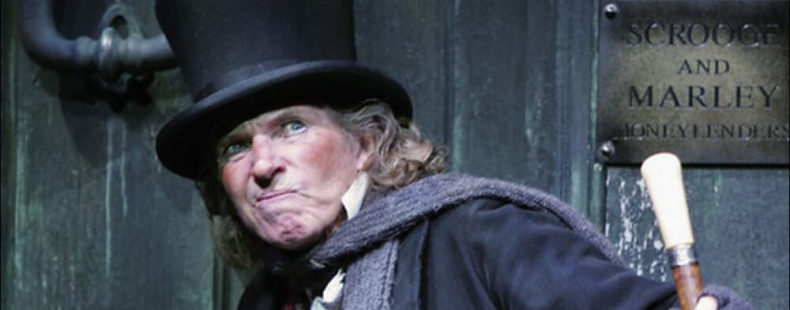When life gives you lemons, make lemonade! That cheer-boosting adage works for some people, but others are perfectly happy sucking sour lemons. Literature is full of chipper lemonade-makers, but there’s something about those lemon-sucking grumps that draws readers in. Is it their angsty sarcasm? Their jaded world-weariness? Their stubborn dedication to doom-and-gloom even when everything else is giggles and rainbows? Are Negative Nancys somehow more realistic than Sunshine Sallys?
Whatever it is, you have to hand it to them—it takes true commitment to be glum all the time and sincere talent to capture readers’ hearts despite their demeanor. In their honor, here are some of literature’s greatest grim-keepers.
Don’t worry, Scrooge and Holden Caulfield are included here too, but Grumpy Bear from the Care Bear children’s series is just as worthy of being included on the list. The proof is in the name!
Grumpy Bear knows that children aren’t idiots. Though they may not have a lot of life experience yet, kids are correctly suspicious about a place called Care-a-Lot populated only by beaming, bubbly bears named Funshine and Tenderheart. Ah, the smell of forced optimism.
So, Grumpy Bear steps in to tell it like it is and to give some tough love. “Tough love” is basically what his belly badge symbolizes: a cloud raining hearts. His light sarcasm helps tone down the neon-brightness of the rainbow. And, when on a mission to begrudgingly care for a kid in need, Grumpy Bear says things like “Well, we’re not here to bake cookies. Let’s get going!” Way to keep ‘em in line, Grumpy Bear. He’s like the grumpy grandpa we never had.
Mr. Darcy, from Jane Austen’s Pride and Prejudice, is similar to Grumpy Bear in many ways. Remove Darcy’s coattails and starched white shirt, and you’ll probably find a furry blue belly best described as “cloudy with a chance of hearts.”
Mr. Darcy is a famously gruff and surly character, although his behavior may appear that way simply because he’s an introvert (we might speculate that Grumpy Bear is too). Well, we take that back. He’s kind of a jerk too. With his friend Mr. Bingley, he snubs Elizabeth Bennet, the woman he ends up marrying: “She is tolerable, but not handsome enough to tempt me.”
Well, Darcy’s certainly not lacking brutal honesty. That’s why when he says to Lizzie in the pouring rain, “I love you. Most ardently,” it melts our hearts—just a bit.
The classic lemon-sucking (more like cocaine-sniffing) sourpuss, Arthur Conan Doyle’s Sherlock Holmes is an exemplar of moody aloofness. Holmes definitely has his vices, and he isn’t always the nicest gentleman; however, Sherlock’s moodiness is probably one of his greatest assets. He looks shrewdly at fact and isn’t swayed by emotion and aesthetic. This makes him a genius . . . but not an easy human to be around. That’s why he has Watson, right? Perfect example:
On a day brilliant with sunshine and with an “exhilarating nip in the air,” Watson praises the beauty of cottages dotting the countryside. “Are they not fresh and beautiful?” Watson cries enthusiastically.
Holmes shakes his head “gravely” and says, “You look at these scattered houses, and you are impressed by their beauty. I look at them, and the only thought which comes to me is a feeling of their isolation and of the impunity with which crime may be committed there….They always fill me with a certain horror.”
As these characters demonstrate, moodiness manifests in different ways—teenage angst, surly genius, bad-day irritability, boxy blueness. Severus Snape is a character people hate to love because of the scathing, slimy quality he brings to grimness. He commits himself to the art of darkness and the discipline of the dark arts. He and Harry Potter have so many irreconcilable differences, it would make the best therapist shudder with anxiety.
Despite being a very grim-keeper indeed, Snape proves himself to be incredibly loyal to Harry and Dumbledore. His moodiness gives him texture and complexity; it’s a shield protecting more sensitive, nuanced emotions. And, can’t we all relate to not wearing our hearts on our sleeves?
For many, Holden Caulfield is reminiscent of high-school English class. The angst-ridden protagonist of J.D. Salinger’s Catcher in the Rye became a hero to many teens forced to read the book. Those teens, finding an empathetic friend in Holden, later conclude the book was actually worth it. Of course, much of Holden’s M.O. is to criticize, whine about, and disparage the world around him. Like in this example:
“That’s the whole trouble. You can’t ever find a place that’s nice and peaceful, because there isn’t any. You may think there is, but once you get there, when you’re not looking, somebody’ll sneak up and write ‘F*** you’ right under your nose.”
The swearing part has a certain appeal to high schoolers. But, the same qualities that some teens appreciate as straight-talk, scream negativity to others. Nevertheless, readers of Catcher in the Rye have at least some emotional reaction to Holden’s character because of his struggles and outspokenness about imperfection. His grim confusion is a wellspring of some pretty profound thoughts that make us all question life.
Surely, you didn’t think we’d leave Mr. Grumpy out of this show! He’s one of fiction’s finest grim-keepers, and probably the best-looking of them all. How could a blue square box with a huge downward parabola mouth and squat appendages not be one blue, moody mother f%*($%.
Do you remember these books? It’s like we are reliving our childhood all over again! Mr. Grumpy is the surly protagonist of Roger Hargreave’s classic children’s book of the same name. In truth, Mr. Grumpy is supremely grumpy to be included in the show because he “can’t stand books.” Ironically, he resides in a splendid book we all love, and we very much hope he doesn’t destroy it. If he did . . . he’d be homeless.
While significant life experiences—like the death of his brother—inform Holden Caulfield’s angry bemusement, the children’s book Alexander and the Terrible, Horrible, No Good, Very Bad Day presents a grumpy protagonist who has a simpler, but equally understandable, reason for being crabby: Alexander’s just having . . . a day! Anyone who says they never experience those days, we’ll try what you’re having.
Like Grumpy Bear, Alexander reassures young readers that it’s OK not to radiate beaming sunshine and sparkles all the time; what’s more, it’s normal! Wearing jade-colored glasses every now and then is totally understandable, particularly if you got up with gum in your hair, tripped on a skateboard, dropped your sweater in a sink full of water, didn’t find a toy in the cereal box, got smushed in the backseat, weren’t praised for your amazing picture of an invisible castle, sang “too loud,” forgot “16” when counting, were snubbed by your best friend—and that’s only half of it. We feel you, Alexander.
In Charles Dickens’s A Christmas Carol, the miserly Ebenezer Scrooge spends a lifetime living terrible, horrible, very bad days and making everyone around him cower in fear. He is probably the poster man of grumpdom, with his famous exclamations of “Bah, Humbug!” The very name Scrooge begs to be said with a sour-lemon scrunched face (like that old hag’s in The Princess Bride, the one who repeatedly yells “Boo”— yea we’re getting old school).
Scrooge’s grimness weighs heaviest when he snarls, “If I could work my will, every idiot who goes about with ‘Merry Christmas’ on his lips should be boiled with his own pudding and buried with a stake of holly through his heart. He should!”
After too many years being a miserable miser, enough is enough, and the three ghosts appear to smack some good sense (and just goodness, in general) into him. Scrooge’s transformation from crabby to happy, irritable to charitable, is what makes his character and narrative actually beloved, despite his horrible attitude for most of the book.
Coraline is a young adult novel by Neil Gaiman. And, the character Coraline is the epitome of moody tween. For instance, she is often annoyed: by rain, grown-ups, ageism, people mistaking her name for Caroline, and for being judged because she is an introvert.
But, once she goes to another world, where she has “other” parents who seemingly aren’t as annoying as her real parents, she realizes that when things are all sunshine and rainbows (and creepy button eyes), life’s not nearly as fun (because there’s nothing to complain about of course!).
To put the cherry on top of this pity-party sundae, there’s no better Gloomy Gus than Eeyore from A.A. Milne’s Winnie the Pooh. Poor Eeyore, the old stuffed donkey who can think of nothing better to do than eat thistles. Talk about grim!
The root of his depression may be that his tail is attached to his rump with only a stick-pin, and thus it frequently falls off. In fact, this might be a truly existential crisis for him: the constant loss of his tail is already an aggravation, but worse, it reminds him that he is merely a stuffed toy, not a real animal!
Beyond the gloom, Eeyore offers a very witty, sardonic perspective. For example, if you wish him a “Good morning!” he’ll respond, “If it is a good morning, which I doubt.” Touché, Eeyore! Way to jazz up the boring meet-and-greet routine!
Maybe it’s his wry humor (if you can call it that) that makes him so lovable, despite the mopes. No matter what, Eeyore always manages to hang in there, even if his tail doesn’t. That’s something we can all take to heart.
























